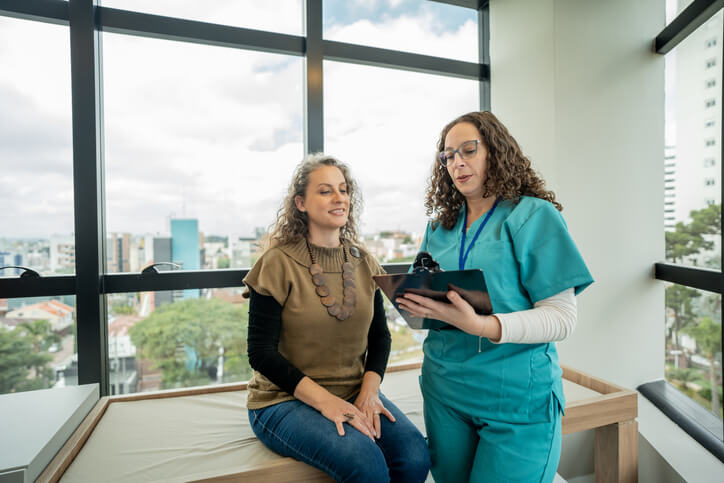
What’s the difference between an FNP and an NP?
Advanced practice nursing allows you to choose from a broad range of specialties. Discover the similarities and differences between a family practice nurse (FNP) and a nurse practitioner (NP), including the required education, certification, and practice environment.
By: Gayle Morris BSN, MSN, Edited by: Rebecca Munday, Reviewed by: Elizabeth Clarke
Last updated: June 17, 2025
Similarities between an FNP and an NP
Family practice is a subspecialty that NPs can choose to become board-certified in. FNPs and NPs share several key similarities in education, responsibilities, salary, and job outlook.

Responsibilities and scope of practice
NPs' and FNPs' scopes of practice or practice authority are defined by state law. Therefore, the specific responsibilities for these nurses vary considerably across the U.S. States fall into one of three categories:
- Full Practice: NPs can independently assess, diagnose, order tests, and initiate treatment without physician supervision or collaboration.
- Reduced Practice: NPs have limited autonomy and must maintain a regulated collaboration agreement with a physician for specific care elements. Those care elements are defined by each state's board of nursing. NPs in these states must sign an agreement outlining the scope of practice and participate in regular quality improvement meetings with their supervising physician. These meetings can happen every six months to a year, depending on the state.
- Restricted Practice: State laws require NPs to work under direct physician supervision or receive delegated authority to provide patient care.
These regulatory differences affect where NPs can work autonomously, prescribe controlled substances, or open independent clinics. Advocates argue that full practice authority improves access to care, particularly in rural and underserved areas.
Under full practice authority, NPs are licensed to independently:
- Conduct physical exams and health assessments
- Diagnose and manage acute and chronic conditions
- Order and interpret diagnostic tests
- Prescribe medications and therapies
- Provide patient education and preventive care
- Make referrals to specialists
Salary and job outlook
FNPs and NPs generally earn comparable salaries because of their advanced qualifications and similar roles within the healthcare setting. According to the Bureau of Labor Statistics (BLS), nurse practitioners earned a median annual salary of $129,210 in 2024.
The BLS projects the demand for NPs to grow by 46% from 2023 to 2033 — this is not only much faster than the average for all occupations but also ranks third among the fastest-growing occupations during the same period. An increasing emphasis on prevention and demand from an aging population may contribute to the growth.
Differences between an FNP and an NP
Choosing between becoming an NP or pursuing a specific focus (such as becoming an FNP) begins with understanding each role's unique scope. These titles reflect advanced levels of nursing practice and are shaped by education, certification, and clinical goals. Clarifying the differences and evaluating which options are best for you are essential when you're considering this professional step.

Work Settings
NPs work in various settings, depending on their specialization:
- Hospitals
- Specialty clinics
- Urgent care centers
FNPs often provide lifelong care across all age groups, unlike many specialized NPs. FNPs typically work in:
- Primary care practices
- Community health centers
- Family medicine clinics
Skills and Traits
NPs develop skills based on their specialty:
- Technical expertise in a focused area
- Acute care or procedural skills
FNPs typically need strong interpersonal skills for long-term family care relationships. FNPs often focus on:
- Broad diagnostic skills across age groups
- Preventive care and patient education
Education and Curriculum
All NPs, regardless of specialty, must have a master's in nursing or a doctorate. The curriculum for such a program includes advanced courses in core areas such as:
- Pathophysiology
- Pharmacology
- Health assessment
However, education and curriculum vary by specialty. These include:
- Acute or/and primary pediatric nurse practitioner
- Adult-gerontology nurse practitioner
- Women's health nurse practitioner
- Psychiatric mental health nurse practitioner
- Neonatal nurse practitioner
Other subspecialty education and training may include:
- Dermatology
- Gastroenterology
- Diabetes
- Forensics
- Oncology
- Nephrology
- Pain management
FNP programs emphasize comprehensive care across all ages, with additional coursework in:
- Family theory
- Crisis health care
- Women's health
- Pediatrics
- Maternal and infant health
- Primary health care for the family
FNPs also need to do additional clinical rotations for women's or maternal health and pediatrics.
The curricula for FNP programs are broader to prepare graduates to provide primary care for diverse age groups across the lifespan. FNP programs focus on:
- Primary care for all ages
- Family health, pediatrics, and geriatrics
Certification and Licensure
NPs and FNPs must earn the same licensure and foundational nursing education, but they diverge in specialization and certification. Both NP and FNP programs require a minimum number of supervised clinical hours that must include population-specific experiences.
- NPs' certification varies by specialty (e.g., pediatric, psychiatric, adult-gerontology) and is obtained through relevant certifying bodies.
- FNP certifications include the FNP-C, which focuses on clinical practice and is offered through the American Academy of Nurse Practitioners Certification Board (AANPCB). The FNP-BC focuses on clinical care, policy, and leadership, and is offered by the American Nurses Credentialing Center (ANCC).
Specialties and Scope of Practice
An NP's scope of practice is defined by their specialty. For example, psychiatric-mental health NPs diagnose and treat mental health conditions, provide psychotherapy, and prescribe medications.
FNPs focus only on primary care, prevention, and treatment across the lifespan, emphasizing continuity of care.
Which nurse practitioner specialty is right for me?
Choosing the right NP specialty is a personal decision that should reflect your interests, strengths, and long-term goals. Start by asking: What patient populations am I passionate about serving? Do I thrive in high-pressure environments like emergency departments, or prefer building long-term relationships in primary care or rehabilitation?
Consider the type of clinical work you enjoy: managing chronic conditions, providing mental health care, or delivering acute interventions. Your ideal work setting matters, too. Do you see yourself in a hospital, private practice, school, or community clinic?
Think about your lifestyle priorities. Are you looking for a role with predictable hours or one that allows flexibility or telehealth opportunities? Evaluate each specialty's educational requirements, certification pathways, and potential for career advancement.
Finally, consider long-term factors like job market trends, geographic demand, and potential salary ranges. Reflecting on these questions and considerations can help you choose a specialty that aligns with your personal values, clinical passions, and career aspirations.